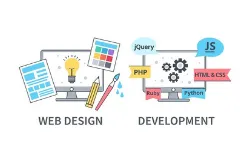Business Analytics Training
Business Analytics Training About business analytics training: Business analytics (BA) is the process of looking at an organization's statistics or data and exploration of it. It is used by companies which makes data driven decisions, and since most companies today are doing this thus this is getting more and more popular. This can even extend to data science which can offer one of the most popular jobs today.
We can use it to gain insights upon our business model and make smart decisions based on that to optimize and automate tasks of business for growth of the organization. Data-driven companies treat their data as a very important asset for their companies and use it for their business advantage. A successful business analytics is one which utilizes and depends upon the quality of data, analysts who are skilled enough and the focus of the company on this sector.
The business analytics techniques can be divided into two main parts. The first part is called the business intelligence technique. This technique involves examining the data of a particular time frame of past to analyse where the company was lacking and reports of the staff. This is a fairly old tactic and many organizations are using this technique since a very long time
The second technique of business analytics is further and brief analysis of statistics. This is where we use more additional and advanced techniques to analyse data from the past or present for predicting the future and bring about fruitful changes to the company’s business model or even the website for instance. This could even go on to using even more advanced techniques for analysis of the customer to group customers of similar interest together.
Specific types of business analytics include: Descriptive analysis: to analyse the present state of business.
Predictive analytics: In this we analyse the current and past data to predict the future.
Prescriptive analytics: This uses the data from the past to improve and generate ideas about the future decisions for the company.Some may think that this is similar to data science but there are a few differences.
Business Analytics Vs Data Science
There are a few advanced areas of business analytics which can represent data science, but there are a few differences. Even if we are using some advanced algorithms to analyse data sets doesn’t means that it is data science. There are a lot of different tools and softwares for business analytics which requires a very few of the skills required for data science.
Data science is more like research upon the data so it definitely involves more advanced techniques whereas, business analytics involves less of those complex techniques to improve current and future state of the business.
Business analytics applications
-
These are various different ways where BA is used It is used in data visualization tools
-
It can also be used in business intelligence reporting software
-
It is used as self-service analytics platforms
-
Also used as statistical analysis tools
-
Used in big data platforms
There is now a good trend of self-service tools for business analytics. The users demand a tool which is simple to use and one which doesn’t require a specific training to use it. These tools can be installed on a single machine and can be distributed to various different computers under administration. Once these machines are running then business analysts can use them to analyse data and generate reports without any special training.
Benefits of business analytics training in career:
1) TO MAKE BETTER BUSINESS DECISIONS: It helps to get better understanding of the statistical and quantitative analysis, you get better at predictive analysis. One can also get better at data interpretation and problem solving skills.
2) TO UNDERSTAND ANALYTICAL TOOLS: We get introduced to the basics of management of data ,decision trees, forecasting, logistics, design of experiments.
3) TO GET MORE BUSINESS ANALYTICS JOBS: You can get jobs in Finance, Marketing, Economics, Statistics, Mathematics etc.
4) TO GET BEST SALARIES: The average salary a person in this sector is nearly Rs 491,522 per year . However the salary may vary depending upon skills like Project Management, Analysis of requirements, Microsoft Visio, SQL etc. One more factor to effect income is for Business Analytics jobs.
Course Topics
1. A Career in Business Analysis Basics of Business Analytics
-
The Role of a Business Analyst
-
What is IT Analyst?
-
Business analysis Process
2. The Enterprise Analysis Studying Business Architecture
-
What is Feasibility Studies?
-
What is Project Scope?
-
What is Preparing a Business Case?
-
Studying Initial Risk Assessment
-
What is The Decision Package?
3. Management, requirements and planning What are Team Roles and Responsibilities?
-
Who are Stakeholders
-
How to handle Work Distribution
-
Define Requirements Risks
-
What is Planning Considerations
-
Ways for Selecting Requirements Activities
-
What are Goals and Estimates
-
What is Requirements Scope
-
What are Measurements and Reporting
-
Managing Requirements Changes
4. Requirements Surveying Eliciting Requirements
-
Brainstorming the possibilities
-
How to do Document Analysis?
-
Who are the Focus Groups
-
What is Interface Analysis?
-
Interviewing
-
Observing
-
Prototyping
-
The workshop on Requirements
-
What is Reverse Engineering ?
-
Surveying
5. Documentation & Requirements Analysis Knowledge Area Definition
-
Prepare a Requirements Packages
-
Creating a Business Domain Model
-
Analysis Tasks
-
What is Data and Behaviour Models?
-
What is Process/Flow Models?
-
What is Usage Models?
6. And in the end: Requirements Communication To create a Communications Plan
-
Managing Requirements anomalies
-
Appropriate Requirements Formats
Job roles after completing Business analytics course:
1)You could work as data scientist and choose to focus more on computer science/technology if you are skilled in computers
2) Or perhaps focus on analysis part while being a data scientist
3) One could even work as an quantitative analyst or modeller who helps in managing risks involved in making decisions based on the trends of data model
4) You could become mainstream Business analyst who analyses business interpretation and analytics
5) Becoming a consultant is another more popular options available as they offer good pay but they require good experience too.
Self-Employment options:
There are a number of employment options available after this course and one can even get self-employed in these sectors 1) You can start by getting in touch with the agencies which are dealing with market researching, software houses and some marketing agencies as well. 2) Some consulting companies may also need your help to fulfil their projects and they need a lot of analysts for analysing part so you could get a subcontract in that 3) Some agencies and start-ups looks for analyst and you could work on contract basis.
Average salary for Business Analyst:
The average salary a person in this sector is nearly Rs 491,522 per year. But this also may vary based on experience and skills. Experience plays a very important part in this area so expect your salary to rise exponentially after a few years.
Average course fee for business analytics Training
Business Analytics course is definitely one of the most popular and helpful course for students. So there is a huge demand for this course and one should look for popular institutes which teach this course. However if you choose to focus on its sub branches then the course fee will vary definitely for example : 1) If you choose the more basic one: which includes analytics modeller, business intelligence analyst then the course fee could be more than Rs.40,000 and the course will be nearly 30 hours long. 2) And if you decide to go for the data scientist part then the fees will be more than Rs.65,000 and the course duration can go up to 40 hours.
Best Training institute for Business analytics
1. Faculty: It is definitely the most crucial part of any coaching centres, because having a good faculty is a must in order to get something out of the course. So we can look for institutes where they have the most experienced and qualified coaches.
2. Personal Attention to each student/batch size: Both of these factors are the second most important thing. So while a batch size too big simply means the classroom will be chaotic and you wont be getting much of personal attention but on the other hand a small batch size could mean that students might not have trust in the institute thus they have a lesser strength of class. So we can aim for an intermediate batch size and the one where you are much comfortable
3. Study Material: Lets face it, for exams like these where there is no syllabus, it can be quite intimidating while starting preparations so a good set of study material is a must in this case
4. Mock and Sectional Tests: If you want to be confident during the exam or you want to judge your preparations before the exams then you have to give mock tests. So check whether the institute conducts regular mock exams.
5. History: Despite all the above criteria you should always analyse how many students studying from an institutes are clearing the test, before you take admission into it.







